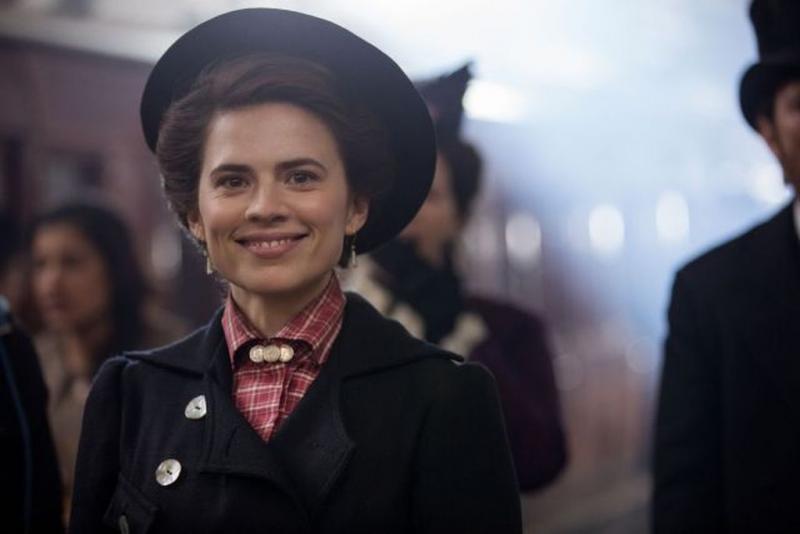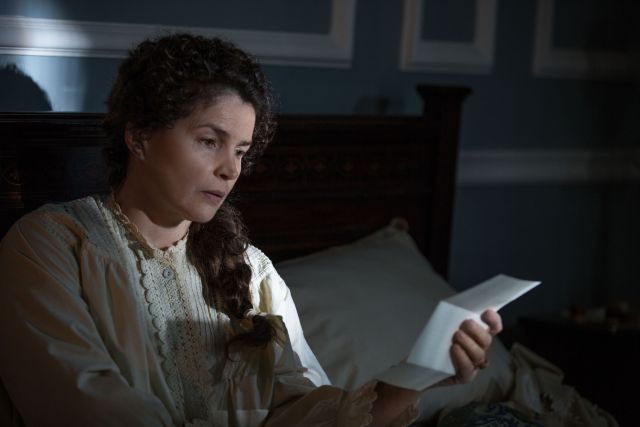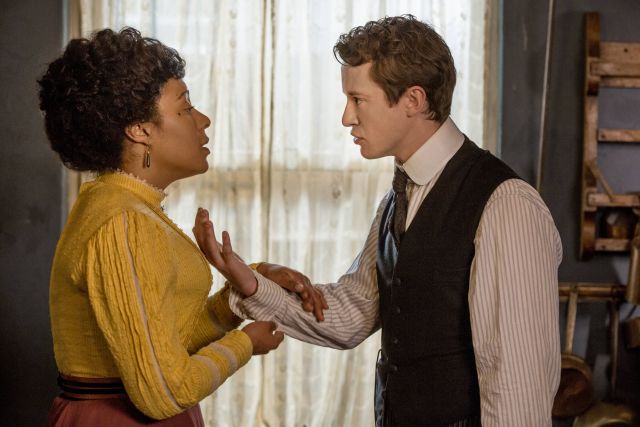Howards End, BBC One review - EM Forster adaptation is finding its footing | reviews, news & interviews
Howards End, BBC One review - EM Forster adaptation is finding its footing
Howards End, BBC One review - EM Forster adaptation is finding its footing
The Schlegel sisters are back, but Julia Ormond (so far) steals the show

Can it really be a quarter-century since that finest of all Merchant-Ivory film adaptations, Howards End, was first released?
Give it time, and one suspects director Hettie Macdonald and her unexpected screenwriter, American Oscar-winner Kenneth Lonergan (of Manchester by the Sea renown), will have tapped into the unique power of a novel that does nothing less than refract English society, mores and values through the homestead of its title. Barely has episode one begun before the family pile of the title is conveyed in careful detail, as seems appropriate given the disparate people who will gather under its roof. The reporter on the scene is Helen Schlegel (the lively Philippa Coulthard), the younger of two orphaned sisters who is writing with characteristic impetuosity to her older sibling, Margaret (Hayley Atwell, inheriting Thompson's breakout role that won her an Oscar). Living in rented Georgian splendour in London (Clerkenwell here doubles as the fictional Wickham Place of the novel), the artsy, impassioned Schlegels soon become intertwined with the far more brash and money-minded Wilcoxes, a brood led by Matthew Macfadyen in hearty form as the cheerfully scornful paterfamilias and a severe-seeming Julia Ormond (pictured above) as his ailing wife, Ruth.
Barely has episode one begun before the family pile of the title is conveyed in careful detail, as seems appropriate given the disparate people who will gather under its roof. The reporter on the scene is Helen Schlegel (the lively Philippa Coulthard), the younger of two orphaned sisters who is writing with characteristic impetuosity to her older sibling, Margaret (Hayley Atwell, inheriting Thompson's breakout role that won her an Oscar). Living in rented Georgian splendour in London (Clerkenwell here doubles as the fictional Wickham Place of the novel), the artsy, impassioned Schlegels soon become intertwined with the far more brash and money-minded Wilcoxes, a brood led by Matthew Macfadyen in hearty form as the cheerfully scornful paterfamilias and a severe-seeming Julia Ormond (pictured above) as his ailing wife, Ruth.
Helen has a brief fling with the younger Wilcox son, Paul (Jonah Hauer-King), but a more promising rapport is established between Atwell's rather determinedly sparky Margaret and the mysterious Ruth, whose imposing facade gives way in Ormond's altogether terrific performance to reserves of self-doubt and anxiety that her formidable manner has attempted partially to disguise. (At this point, Ormond is the only one to rival in one's affections the 1992 Merchant/Ivory cast, which had Vanessa Redgrave as Ruth.) Fussing around the periphery of the Schlegel household are Tracey Ullman in almost self-satiric form as that eternal busybody, Aunt Juley, and Alex Lawther as the youngest Schlegel (and only male), Tibby, a piano devotee whom Lawther invests with the forlorn countenance of an embryonic Alan Bennett. And If you ever wanted to hear Ullman speak the word "disaggregated", here's your chance. This first episode, one felt, didn't make a point once if it could belabour it for effect, whether the subject to hand was the quasi-reactionary Henry's dismissal of all manner of causes as "bosh", or a degree of simpering from Tibby to make one wonder why his elder sisters didn't simply disown him. But that would be to contravene the ready-made decency and amity that drive Margaret, in particular, ever onwards, her insistence on good manners the mechanism that brings this kindly soul into the wary orbit of the (occasionally) bedridden Ruth, with whom Margaret is soon going Christmas shopping.
This first episode, one felt, didn't make a point once if it could belabour it for effect, whether the subject to hand was the quasi-reactionary Henry's dismissal of all manner of causes as "bosh", or a degree of simpering from Tibby to make one wonder why his elder sisters didn't simply disown him. But that would be to contravene the ready-made decency and amity that drive Margaret, in particular, ever onwards, her insistence on good manners the mechanism that brings this kindly soul into the wary orbit of the (occasionally) bedridden Ruth, with whom Margaret is soon going Christmas shopping.
It's too early to tell what impact Joseph Quinn's Leonard Bast will have on proceedings, that character's defining relationship with Jacky (Rosalind Eleazar, pictured above with Quinn) deferred for the most part to subsequent episodes. For now, Quinn communicates a nascent sadness to this hapless insurance clerk that seems prophetic, to say the least, even if one can't quite intuit the kinetic attraction that draws the Schlegel women towards him beyond their often-expressed desire to do the right thing, which in this instance means reuniting him with his umbrella. The series for its own part is being billed by the BBC as "an early Christmas present", and there's certainly enough so far to heighten anticipation while we struggle a century on from Forster's novel to discover whether it will be the Schlegels or the Wilcoxes amongst us who inherit the earth.
Add comment
The future of Arts Journalism
You can stop theartsdesk.com closing!
We urgently need financing to survive. Our fundraising drive has thus far raised £49,000 but we need to reach £100,000 or we will be forced to close. Please contribute here: https://gofund.me/c3f6033d
And if you can forward this information to anyone who might assist, we’d be grateful.

Subscribe to theartsdesk.com
Thank you for continuing to read our work on theartsdesk.com. For unlimited access to every article in its entirety, including our archive of more than 15,000 pieces, we're asking for £5 per month or £40 per year. We feel it's a very good deal, and hope you do too.
To take a subscription now simply click here.
And if you're looking for that extra gift for a friend or family member, why not treat them to a theartsdesk.com gift subscription?
more TV
 Murder Before Evensong, Acorn TV review - death comes to the picturesque village of Champton
The Rev Richard Coles's sleuthing cleric hits the screen
Murder Before Evensong, Acorn TV review - death comes to the picturesque village of Champton
The Rev Richard Coles's sleuthing cleric hits the screen
 Black Rabbit, Netflix review - grime and punishment in New York City
Jude Law and Jason Bateman tread the thin line between love and hate
Black Rabbit, Netflix review - grime and punishment in New York City
Jude Law and Jason Bateman tread the thin line between love and hate
 The Hack, ITV review - plodding anatomy of twin UK scandals
Jack Thorne's skill can't disguise the bagginess of his double-headed material
The Hack, ITV review - plodding anatomy of twin UK scandals
Jack Thorne's skill can't disguise the bagginess of his double-headed material
 Slow Horses, Series 5, Apple TV+ review - terror, trauma and impeccable comic timing
Jackson Lamb's band of MI5 misfits continues to fascinate and amuse
Slow Horses, Series 5, Apple TV+ review - terror, trauma and impeccable comic timing
Jackson Lamb's band of MI5 misfits continues to fascinate and amuse
 Coldwater, ITV1 review - horror and black comedy in the Highlands
Superb cast lights up David Ireland's cunning thriller
Coldwater, ITV1 review - horror and black comedy in the Highlands
Superb cast lights up David Ireland's cunning thriller
 Blu-ray: The Sweeney - Series One
Influential and entertaining 1970s police drama, handsomely restored
Blu-ray: The Sweeney - Series One
Influential and entertaining 1970s police drama, handsomely restored
 I Fought the Law, ITVX review - how an 800-year-old law was challenged and changed
Sheridan Smith's raw performance dominates ITV's new docudrama about injustice
I Fought the Law, ITVX review - how an 800-year-old law was challenged and changed
Sheridan Smith's raw performance dominates ITV's new docudrama about injustice
 The Paper, Sky Max review - a spinoff of the US Office worth waiting 20 years for
Perfectly judged recycling of the original's key elements, with a star turn at its heart
The Paper, Sky Max review - a spinoff of the US Office worth waiting 20 years for
Perfectly judged recycling of the original's key elements, with a star turn at its heart
 The Guest, BBC One review - be careful what you wish for
A terrific Eve Myles stars in addictive Welsh mystery
The Guest, BBC One review - be careful what you wish for
A terrific Eve Myles stars in addictive Welsh mystery
 theartsdesk Q&A: Suranne Jones on 'Hostage', power pants and politics
The star and producer talks about taking on the role of Prime Minister, wearing high heels and living in the public eye
theartsdesk Q&A: Suranne Jones on 'Hostage', power pants and politics
The star and producer talks about taking on the role of Prime Minister, wearing high heels and living in the public eye
 King & Conqueror, BBC One review - not many kicks in 1066
Turgid medieval drama leaves viewers in the dark
King & Conqueror, BBC One review - not many kicks in 1066
Turgid medieval drama leaves viewers in the dark
 Hostage, Netflix review - entente not-too-cordiale
Suranne Jones and Julie Delpy cross swords in confused political drama
Hostage, Netflix review - entente not-too-cordiale
Suranne Jones and Julie Delpy cross swords in confused political drama

Comments
I don't think Joseph Quinn is